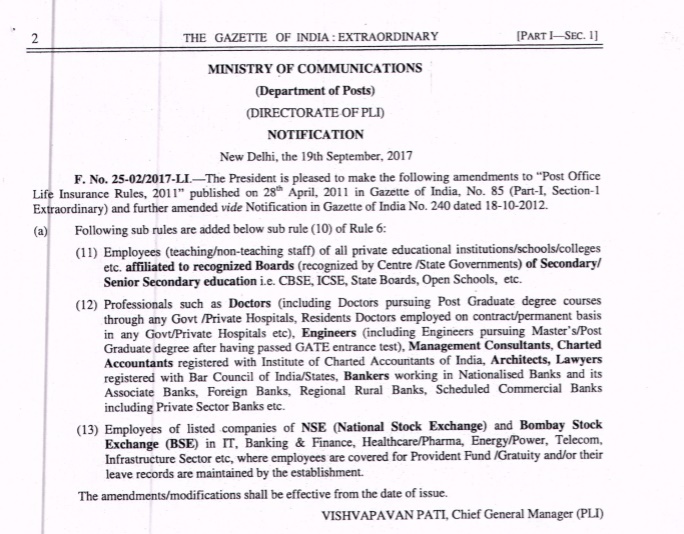Do you know the new eligibility for PLI (Postal Life Insurance)
rules? Many of us unaware that Post Office also offers the Life
Insurance. However, the eligibility is restricted earlier. Due to the
huge competition, recently they changed the rules.
What is PLI (Postal Life Insurance)?
PLI
(Postal Life Insurance) is exactly like any Life Insurance company, for
example, LIC or ICICI Pru Life Insurance. The only difference is, it is
run and managed by Post Office. PLI currently offers only traditional
plans. Therefore, no term insurance or ULIPs. The policies are offered
by Government Of India through Post Office.
The advantage of PLI is that they offer you the products at the cheaper premium with high bonus rates.
Currently, PLI offers 6 types of policies and they are as below.
- Whole Life Assurance (SURAKSHA)
- Convertible Whole Life Assurance (SUVIDHA)
- Endowment Assurance (SANTOSH)
- Anticipated Endowment Assurance (SUMANGAL)
- Joint Life Assurance (YUGAL SURAKSHA)
- Children Policy(BAL JEEVAN BIMA)
Advantages of investing in PLI (Postal Life Insurance)
- You can avail of the tax benefits by investing in PLI under Sec.80C.
- The premium you pay towards PLI is very low compared to other Life Insurance Companies premium rate (inclusive of LIC).
- PLI offers the highest bonus rate (more than LIC plans).
- Facilities like – Assignment, Loan, Conversion, Surrender and Paid Up Value options are also available.
- You can transfer the policy to any Circle within India, at no additional charges.
- PLI provides you the passbook facility to track the payment of premium and in case of loan transactions, etc.
- You can pay the premium annually, half-yearly and monthly basis.
- You can avail 1% discount on the premium if you make an advance premium payment for a policy period of 6 months.
- You can avail 2% discount on the premium if you make an advance premium payment for a policy period of 12 months.
- Nomination facility is also available.
New Eligibility for PLI (Postal Life Insurance)
A reader commented in my blog post about the new eligibility for PLI (Please refer the comment “Postal Life Insurance Vs LIC-Which is best?“.
However, I was also unaware of the same. Finally, he sent the
Government notification in this regard. Hence, thought to update the
same.
Let me give you the list of eligibility for PLI as per old rules and they are as below.
- Central Government
- Defense Services
- Para-Military forces
- State Government
- Local Bodies
- Government-aided Educational Institutions
- Reserve Bank of India
- Public Sector Undertakings
- Financial Institutions
- Nationalized Banks
- Autonomous Bodies
- Extra Departmental Agents in Department of Posts
- Employees Engaged/ Appointed a Contract basis by central/ State Government where the contract is extendable
- Employees of all Scheduled Commercial Banks
- Employees of Credit Co-operative Societies and other Co-operative Societies registered with Government under the Co-operative Societies Act and partly or fully funded from the Central/ State Government/RBI/ SBI/ Nationalized Banks/ NABARD and other such institutions notified by Government
- Employees of deemed Universities an educational institutes accredited by recognized bodies such a National Assessment and Accreditation Council, All India Council of Technical Education, Medical Council of India etc.
The insurance industry in
India has undergone transformational changes after liberalization of the
insurance industry in the year 2000, subsequent to setting up of the
IRDA.
In such a competitive life insurance industry scenario, PLI
felt it necessary to open the doors of eligibility for other individuals
also. Hence, they came up with the notification on 18th October 2017.
Sadly, the PLI portal still refers to the old eligibility rules. Below
is the Government notification of the same.

Based on the above list, I am sharing you the below new eligibility for PLI (Postal Life Insurance) rules as below.
- Central Government
- Defense Services
- Para-Military forces
- State Government
- Local Bodies
- Government-aided Educational Institutions
- Reserve Bank of India
- Public Sector Undertakings
- Financial Institutions
- Nationalized Banks
- Autonomous Bodies
- Extra Departmental Agents in Department of Posts
- Employees Engaged/ Appointed a Contract basis by central/ State Government where the contract is extendable
- Employees of all Scheduled Commercial Banks
- Employees of Credit Co-operative Societies and other Co-operative Societies registered with Government under the Co-operative Societies Act and partly or fully funded from the Central/ State Government/RBI/ SBI/ Nationalized Banks/ NABARD and other such institutions notified by Government
- Employees of deemed Universities an educational institutes accredited by recognized bodies such a National Assessment and Accreditation Council, All India Council of Technical Education, Medical Council of India etc.
- Employees (teaching or non-teaching staff) of, all private educational institutions/schools/colleges etc. affiliated to recognized Boards (recognized by Centre / State Governments) of Secondary / Senior Secondary education i.e. CBSE, ICSE, State Boards, Open Schools, etc.
- Professionals such as Doctors (includingDoctorspursuing Post Graduate degree courses through any Govt/Private Hospitals,Residents Doctorsemployedon contract/ permanent basis in any Govt/PrivateHospitalsetc),Engineers (including’ Engineers pursuing Master’s /’ Post·Graduate degree after having passed GATE entrance test), Management Consultants; Chartered Accountants (registered with Institute orCharteredAccountantsofIndia),Architects, Lawyers (registered with Bar Council of India/ States ), Bankers (working in Nationalised and its Associate Banks,Foreign Banks,Regional Rural Banks,Scheduled Commercial Banks including Private Sector Banks) etc.
- Employees of listed companies of NSE (National Stock Exchange) and Bombay Stock Exchange (BSE) in IT, Banking & Finance, Healthcare/ Pharma, Energy/power, Telecom, Infrastructure Sector etc, where employees are covered for Provident Fund./ Gratuity and / or their leave records are maintained by the establishment







0 comments:
Post a Comment